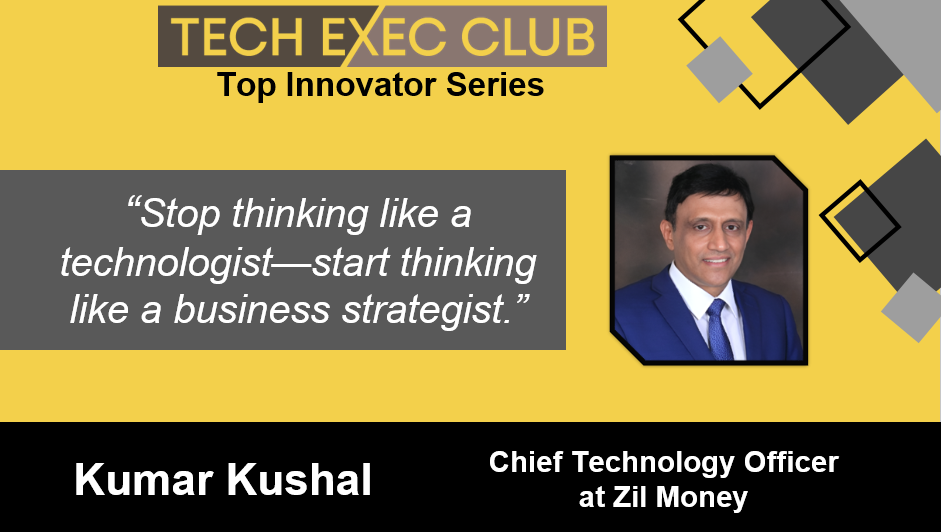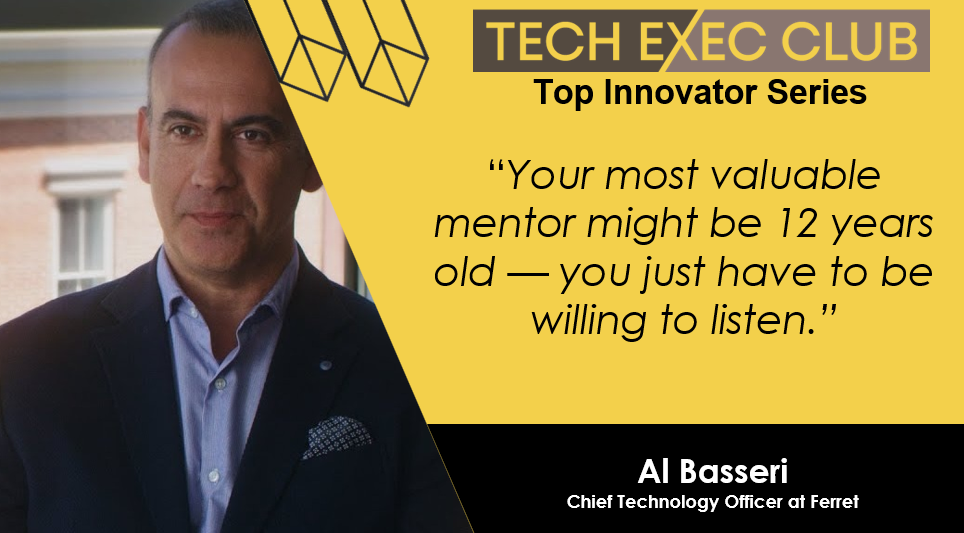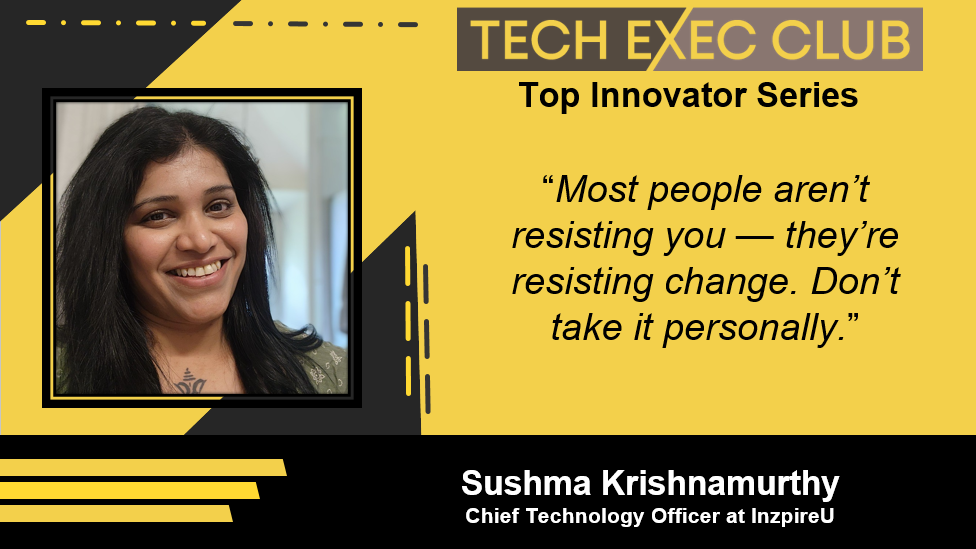For many technology leaders, the Chief Technology Officer (CTO) role is defined by innovation, architecture, and engineering excellence. But for Kumar Kushal, CTO of ZilMoney, the role is about something much bigger—monetization and business growth.
With a career that includes leading Reliance Industries, India’s largest telecom company, Kumar has learned that technology is only as valuable as the revenue it generates. His experience at Reliance opened his eyes to large-scale monetization strategies, where billions were invested in infrastructure, but the real success came from how that technology was commercialized.
Now at ZilMoney, a fintech platform processing over $20 billion in transactions annually, Kumar is bringing that same strategic mindset. Despite its high transaction volume, the company generated only $10 million in revenue—a gap that Kumar saw as an opportunity. He aims to transform ZilMoney into a multi-billion-dollar enterprise by scaling its monetization strategy, refining its user experience, and leveraging technology for business impact.
In this conversation, Kumar shares his leadership philosophy, his focus on business over pure technology, and how he is driving a shift in mindset within his teams to think beyond development and into revenue generation.
Technology is Not Enough—Monetization is the Key to Success
For many CTOs, success is measured by technological advancements, scalability, and system performance. But for Kumar Kushal, technology without monetization is meaningless.
At ZilMoney, Kumar saw a stark contrast between the company’s transaction volume and revenue generation. With $20 billion in annual transactions but only $10 million in revenue, he realized that the real challenge wasn’t technological—it was financial strategy.
“CTO is not about technology,” Kumar explains. “It’s about monetization.”
This philosophy has shaped his leadership approach. Technology serves the business—not the other way around. Every decision, from infrastructure to product development, is made with a focus on driving revenue.
Kumar’s work at ZilMoney centers on Expanding revenue models beyond transaction fees, leading monetization strategies that leverage financial data and SME financing, and ensuring every tech initiative aligns with business growth.
For Kumar, the accurate measure of success is technological innovation and the ability to turn that innovation into sustainable revenue.
Lessons from Reliance Industries: The Art of Large-Scale Monetization
Kumar’s understanding of monetization didn’t develop overnight. His time at Reliance Industries, India’s largest telecom company, played a critical role in shaping his business-first approach to technology.
At Reliance, Kumar saw billions of dollars being invested in telecom infrastructure. Initially, it wasn’t clear how such massive investments would generate returns. But Reliance’s strategy was bold and unconventional—they launched their telecom services for free, offering unlimited data and calling for an entire year.
The results were groundbreaking: Millions of users adopted the service overnight. Reliance went from a $40 billion market cap to over $200 billion. The focus wasn’t on short-term profits but on creating long-term market dominance.
This experience changed the way Kumar viewed technology. It’s not just about creating a product—it’s about understanding how to commercialize it.
Now, at ZilMoney, Kumar is applying the same strategic thinking to fintech. Instead of seeing payments as a static service, he envisions a financial ecosystem that includes lending, cash flow management, and embedded finance solutions for SMEs.
“The limitation isn’t in technology,” Kumar says. “It’s in how people think about monetization.”
Breaking Growth Barriers: Overcoming Limited Thinking in Business
Kumar believes one of the most significant barriers to success isn’t technical—it’s psychological. Many companies, even those with strong technology, fail because their leadership limits their potential.
He identified a key problem at ZilMoney: the company was operating with a limited mindset. While competitors in the fintech space were scaling rapidly, ZilMoney was stuck in a narrow view of its business model.
“The issue isn’t technology,” Kumar explains. “It’s a lack of vision for what the company can become.”
To overcome this, Kumar encourages leadership to think beyond traditional payment processing into SME financing and embedded financial services. These revenue models scale beyond simple transaction fees.
This shift in thinking is what separates successful companies from stagnant ones. By challenging conventional approaches, Kumar is positioning ZilMoney for rapid growth.
Balancing Technology and Business: Leading a Team with a Revenue Focus
One of Kumar’s most significant leadership challenges has been aligning his technology team with business goals. Many engineers focus solely on building great products without considering how those products generate revenue.
To change this mindset, Kumar has been driving a culture shift within his teams: Developers are trained to think about business impact, not just code. Every tech decision is evaluated based on its contribution to revenue. Monetization is seen as a shared responsibility—not just a business function.
“Without the tech, you can never monetize,” Kumar explains. “But without monetization, the tech doesn’t matter.”
By integrating business strategy into the engineering culture, Kumar ensures that his team isn’t just building products—they’re building a business.
The Future of Fintech: AI, Payments, and SME Growth Strategies
Looking ahead, Kumar sees AI and automation as the biggest drivers of fintech innovation. He is already exploring AI-driven development tools that allow teams to Accelerate product development by reducing engineering time, improving decision-making through AI-driven financial insights, and scaling operations efficiently without increasing costs.
Additionally, he is focused on leveraging financial data to create new monetization opportunities, including Automated SME lending based on transaction history, real-time cash flow optimization for businesses, and embedded financial services that integrate seamlessly into business operations.
“The next phase of fintech isn’t just about payments,” Kumar says. “It’s about building an entire ecosystem that helps businesses grow.”
With his business-first mindset and deep technological expertise, Kumar is positioning ZilMoney at the forefront of the next wave of fintech innovation.
Applying Kumar Kushal’s Leadership Lessons
Kumar Kushal’s journey from technology leader to business strategist offers valuable insights for any CTO, tech executive, or entrepreneur looking to drive real impact. His approach to monetization, business growth, and scaling technology goes beyond traditional CTO responsibilities—focusing on turning technology into revenue.
If you want to apply these lessons in your leadership, here’s where to start:
1. Shift Your Mindset from Technology to Monetization: Don’t build for the sake of building—focus on how your technology generates revenue. Align your tech strategy with business goals—every feature should contribute to monetization. Ask yourself: Is this innovation solving a real business problem?
2. Learn the Art of Large-Scale Monetization: Study business models beyond your industry—Kumar learned key lessons from telecom that he applied to fintech. Think more prominent—if you’re only monetizing one revenue stream, you’re limiting your potential in how industry leaders like Amazon, Reliance, and FinTech unicorns have scaled their monetization strategies.
3. Overcome Limited Thinking in Your Organization: Challenge existing assumptions—why is your business operating as it is? Can it be done better? Expand beyond conventional models—look for untapped revenue streams in your data and customer behavior. Encourage a culture where people think beyond their current roles—engineers should consider the business impact, and business teams should understand technology’s role in growth.
4. Build a Technology Team That Thinks Like a Business Team: Train your engineering and product teams to think about business outcomes, not just development. Ensure every tech investment relates to revenue generation or cost efficiency. Make monetization a shared responsibility across departments—tech, product, marketing, and finance must work together.
5. Stay Ahead with AI, Automation, and Fintech Innovation: Explore AI-driven development tools—they can cut engineering time dramatically and improve efficiency. Leverage financial data to build more imaginative fintech solutions—AI-driven lending, cash flow optimization, and embedded finance are the future. Innovate with new business models—payments are just the beginning. Think about lending, B2B finance, and ecosystem-driven monetization.
Technology Alone is Not Enough
Kumar’s leadership at ZilMoney reminds CTOs to think beyond technology. The best tech leaders understand that business success is the ultimate metric—not just how advanced a platform is but how effectively it generates revenue, scales, and creates real market impact.
Want to lead with the same mindset? Start thinking like a business strategist, not just a technologist. The future of leadership belongs to those who can bridge the gap between innovation and monetization.
A CTO Who Thinks Like a Business Leader
Kumar Kushal’s journey is a testament to the fact that technology alone doesn’t drive success—business strategy does. His ability to bridge the gap between technology and monetization has allowed him to transform companies, from his time at Reliance Industries to his leadership at ZilMoney.
At ZilMoney, Kumar is proving that the proper role of a CTO isn’t just to build cutting-edge technology—it’s to ensure that technology translates into revenue and long-term growth by rethinking business models, leveraging AI, and breaking free from conventional industry thinking, he is positioning the company for multi-billion-dollar success.
For tech leaders looking to make a real impact, Kumar’s leadership approach offers a powerful lesson: Stop thinking like a technologist and start thinking like a business strategist. The companies that thrive in today’s fast-paced world aren’t just the ones with the best technology—they’re the ones that know how to turn that technology into sustainable, scalable revenue. As the fintech landscape evolves, leaders like Kumar remind us that innovation is only valuable when it drives actual business results. For those willing to embrace this mindset shift, the opportunities for success are limitless.
Want to hear Kumar Kushal’s insights firsthand? Watch the full, live podcast interview [click here]





